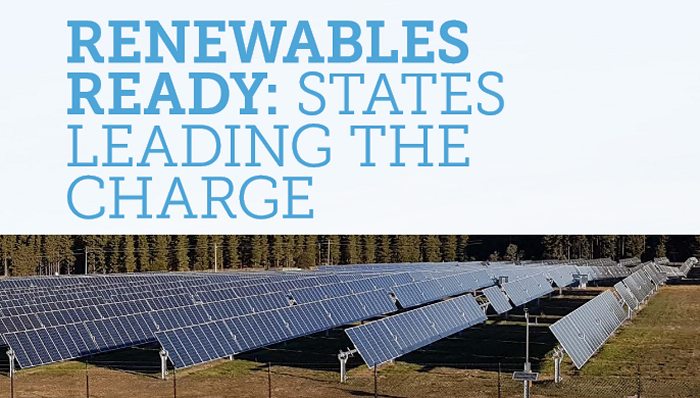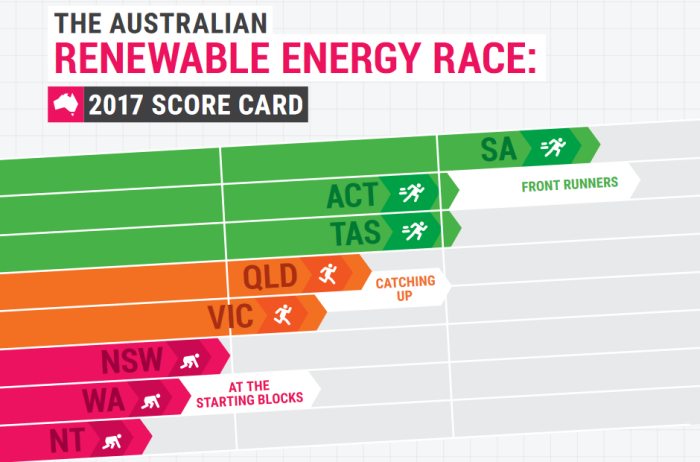
Australia’s states and territories are lifters and the Federal Government continues to be a leaner on renewable energy and emissions reduction.
A new report from the Climate Council states all Australian states and territories (except WA) now have strong renewable energy targets and/or net zero emissions targets in place.
In its 2017 state scorecard, the Council says while there is an absence of solid policy at a Federal level, state and territory renewable targets are broadly consistent with action needed on climate change.
Here’s how the state leaderboard looks:
South Australia
Overall score: A / 50% renewable energy by 2025 / Net zero emissions by 2050
Australian Capital Territory
Overall score: A / 100% renewable energy by 2020 / Net zero emissions by 2050
Tasmania
Overall score: A / 100% renewable energy by 2022 / Net zero emissions by 2050
Queensland
Overall score: B / 50% renewable energy by 2030 / Net zero emissions by 2050
Victoria
Overall score: B / 25% renewable energy by 2020 / 40% renewable energy by 2025 /Net zero emissions by 2050
New South Wales
Overall score: C / No renewable energy target /Net zero emissions by 2050
Western Australia
Overall Score: C / No renewable energy target / No net zero emissions target
Northern Territory
Overall score: C / 50% renewable energy by 2030 / No net zero emissions target
The Council says since its report last year, New South Wales and the Northern Territory have seen the most dramatic positive shift in policy support for renewable energy and emissions reductions.
The states with the largest increase in renewables’ share of the energy mix last year were South Australia (boosted wind generation and a reduction in coal-fired power) and New South Wales, which saw a doubling in hydro generation due to low water levels in the previous year.
In terms of home solar power, the report identifies Queensland, South Australia and Western Australia as having the highest proportion of households with solar panels.
Although WA is a small-scale solar leader, the Climate Council has expressed concern Western Australia is lagging behind other states on renewable energy generally, despite having excellent resources.
Federal Government Relying On States And Territory Efforts
While upbeat about state efforts, the report is critical of the Federal Government’s contribution, stating it is relying on the states and territories to meet emissions reduction targets.
“The Federal Government has no plans to encourage investment in new renewable energy in Australia beyond the existing policy framework set in place prior to the current government’s election,” says the report. “Renewable energy targets set by the Australian Government are not in line with effectively tackling climate change.”
The Council notes the Clean Energy Target recommended by the Finkel Review would encourage new investment in renewables to meet electricity demand and put downward pressure on power prices. However, it remains the only measure out of the Review’s 50 recommendations that the Federal Government has not yet accepted
The Council acknowledges the Federal government has taken some positive steps on energy storage.
The Renewables Ready : States Leading The Charge report can be downloaded here (PDF).


 RSS - Posts
RSS - Posts



Ah, yes. In WA, it is clear that the people, and not the state parliament, are acting to try to protect the environment. One of the things that each state government could do, is implement statutory requirements for all existing rental accommodation and all new housing, to have solar water heating systems and rooftop photovoltaic systems, each of capacity relative to the number of bedrooms. For all existing rental accommodation, a transit period could be provided, eg, three years, and, all new housing started after the legislation is implemented, could be subject to the requirements. And, the Clean Energy Finance Corporation could offer interest free loans to owner-occupiers, to install domestic rooftop photovoltaic systems and associated storage batteries, and, solar water heating systems.
Then, we would have accelerated progress.
And, then, the Clean Energy Finance Corporation (or, Commission?) would be really worthwhile.
Here is an interesting question, in terms of “the states leading the way” regarding renewable energy; in the context of reports that have been published, which reports make the point that renters and the less well off are unable to take advantage of solar energy – the question is thus;
Which. if any, state and territory governments are installing, or, have installed, on all of their state housing rental accommodation, solar water heating systems and domestic rooftop photovoltaic systems with associated storage batteries (with the storage batteries sufficient to provide electricity backup in the event of electricity supply failures)?
It sounds like a reasonable proposition, to me.
You are not reducing emissions. All you are doing is moving heavy industry from countries that don’t have affordable coal fired power to countries that do.
Harvey, can you name some countries that have lower costs of industrial electricity than Australia? There are not many of them, so I am interested in making a complete list.